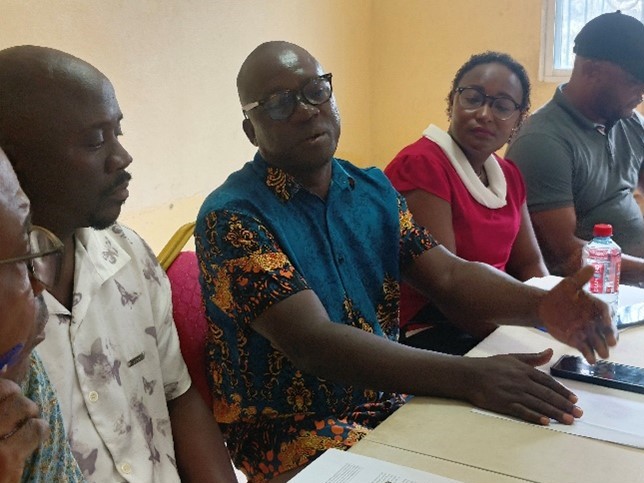The escalating influx of undocumented Burkinabe and Ivorian nationals into Liberia has sparked alarm among Liberians and a coalition of NGOs, who are urging the government to take immediate action to address the growing crisis. The migrants, primarily involved in illegal mining and cocoa farming, are causing widespread environmental damage, land conflicts, and even loss of life in bordering counties such as Grand Gedeh, Rivergee, Maryland, and Nimba. The NGO Coalition of Liberia convened a press conference to express their deep concerns and demand government intervention to stem the tide of illegal immigration and its devastating consequences.
The coalition’s National Facilitator, Mitchell Brown, emphasized the urgent need for government action, warning that inaction could lead to widespread instability and further environmental degradation. He highlighted the destructive impact of illegal activities, including the clearing of primary forests for cocoa farms and mining operations, which threatens biodiversity and the livelihoods of local communities. The situation is particularly dire in the Grebo-Krahn National Park, a critical biodiversity hotspot, where clashes between traditional leaders, forest rangers, and foreign settlers are escalating, endangering both the protected area and human lives.
The unregulated arrival of these migrants is exacerbating existing land disputes and increasing the risk of violent conflicts. Local communities are being displaced as their ancestral lands are encroached upon for illegal agricultural expansion and mining activities. The coalition is demanding that the government implement measures to regulate immigration, protect communities from displacement, and enforce environmental laws to prevent further destruction of Liberia’s natural resources. They also called for transparency from the government regarding steps taken to address the crisis and prevent further loss of life.
The coalition’s concerns underscore a critical need for a comprehensive government response to this complex issue. The illegal influx of migrants is not only a threat to Liberia’s environmental integrity but also to its social stability and economic well-being. The clearing of forests for cocoa farming and mining activities contributes to deforestation, habitat loss, and soil erosion, undermining the long-term sustainability of the country’s natural resources. Furthermore, the displacement of local communities and the resulting land conflicts can lead to social unrest and violence, further destabilizing the affected regions.
The coalition’s call for government intervention highlights the importance of robust border control measures, effective immigration policies, and the enforcement of environmental regulations. The government must take decisive action to register and monitor the movement of foreign nationals, ensuring that those engaged in economic activities do so legally and sustainably. Furthermore, it is crucial to strengthen land tenure systems and protect the rights of local communities to their ancestral lands. This will require effective mechanisms for conflict resolution and the equitable distribution of benefits from natural resource exploitation.
Ultimately, addressing this crisis requires a multi-faceted approach involving collaboration between government agencies, local communities, and civil society organizations. The government must invest in capacity building for border control agencies, provide resources for environmental monitoring and enforcement, and promote sustainable development initiatives that benefit local communities. Furthermore, engaging in dialogue with neighboring countries to address the root causes of migration and promote regional cooperation on border management is essential. Only through a concerted and coordinated effort can Liberia effectively manage the influx of migrants, protect its natural resources, and ensure the well-being of its citizens.














